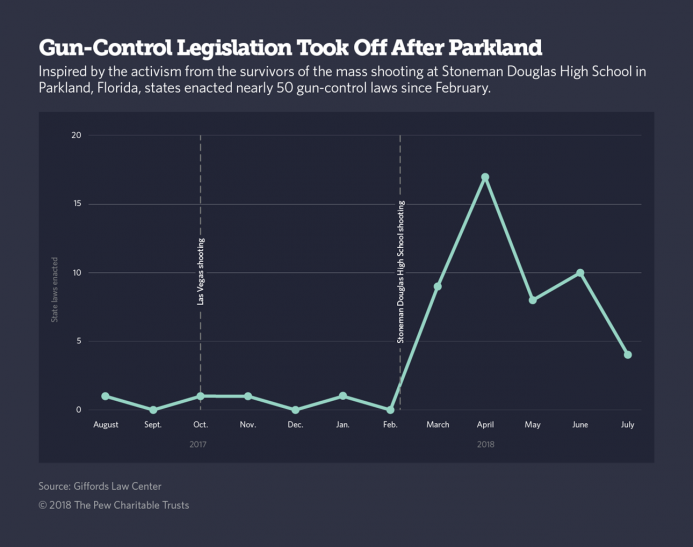The Myth Of Political Inaction On Gun Control – OpEd
By MISES
By Tho Bishop*
One of the many unfortunate consequences of the politicization of America is the natural reaction for political factions to bunker down with dependable talking points in the immediate aftermath of a tragedy.
There is perhaps no issue where this is more obvious than gun control, where the political discourse has effectively devolved into sharing mindless memes before even the most basic facts are known. Obviously, the repeated reading of political scripts lends itself to the perpetuation of false conclusions and faulty analysis.
One of the best writers out there correcting the record is our own Ryan McMaken. His work has highlighted there is plenty of evidence that shows that there is simply no correlation between gun ownership rates and gun violence, the misuse of international comparisons to America, and that it’s a general mistake to look at a collective rate of gun violence in the US.
Beyond the issue of gun policy itself, there is another basic fallacy whenever there is a discussion over political solutions to a particular problem — a narrow focus on federal action.
For example, in the aftermath of this weekend’s shootings, there has been a lot of noise regarding the lack of federal responses to past mass shootings. Ignoring the questions of whether any sort of legislative response would be either desirable or constitutional, there is a fundamental problem in viewing the federal government as the only legislative body that creates public policy.
If we consider state governments, for example, we have seen a dramatic rise in gun control measures since the Parkland High School shooting in 2018.
As Pew Research noted in August of last year, 50 different gun-focused bills were signed into law by both Democrat and Republican governors just five months after the tragedy. This trend continued in 2019, with numerous bills working their way across the country, particularly the “red flag” laws that have even won the support of the NRA.

As one would expect, states have taken dramatically different approaches to the issue, based on their population and ideological bent of the legislature. California, for example, has passed some of the most restrictive laws in the country, including background checks on ammo purchases and a ban on large-capacity magazines that has been the subject of a legal challenge. In contrast, Oklahoma’s governor signed a “Constitutional Carry” bill just this year.
The advantages of this decentralized approach are numerous.
One, there are clear differences in the needs and wishes of a state like California and a place like Wyoming or Montana.
Two, it helps defuse the high-stakes game of political domination that has helped erode American civil society. If half the country views the right to bear arms as a natural right that serves as a vital bulwark against government tyranny, and the other views it as an immoral defense of normalizing weapons of war, there is very little room for compromise. Instead, these political disagreements become a battle of the politically powerful vs. the politically vanquished, with the sides being determined every two years. Control over the senate or the judicial system becomes a matter of self-defense. The result is the saying of “politics as war through other means” taking on a very literal reading.
A third advantage arises when we look at the performance of these state-passed gun laws, allowing the opportunity for unexpected consequences of these policies to play out in real life.
For example, we have seen how red-light laws in Maryland have led to the death of a man never convicted of a crime. Similarly, we’ve seen county-level nullification of tighter gun control laws in Washington state, with rural county sheriffs refusing to enforce laws promoted by urban politicians that they see as unconstitutional infringements on the second amendment (and an example of political decentralization beyond the state level).
A less obvious consequence is that pushing for legislation at the federal level helps feed the political theater of the absurd.
For example, if Republican politicians know that gun control is extremely unpopular with their base, but don’t want to be seen as being indifferent to a national tragedy, their response is to find easier targets to hit. This has played out this weekend with many Republican leaders, including the president, returning to the tired old crusade of ranting about video games and social media as the true villains of this weekend’s tragedies.
Of course, we should not underestimate a politician’s ability to turn obvious absurdity into law. It is easy to foresee there being enough dolts in Congress willing to act on such desperate scapegoating.
In fact, as some forms of gun control manage to win bipartisan support, the best protection against federal infringement of American gun rights is the very political dysfunction often lamented by the press and other “Serious People.”
Any American that values their gun rights should hope some new twitter spat between Trump and “the Squad” can prevent bipartisan cooperation toward the president’s desire to “take the guns first, go through due process second.”
*About the author: Tho Bishop is an assistant editor for the Mises Wire, and can assist with questions from the press.
Source: This article was published by the MISES Institute

